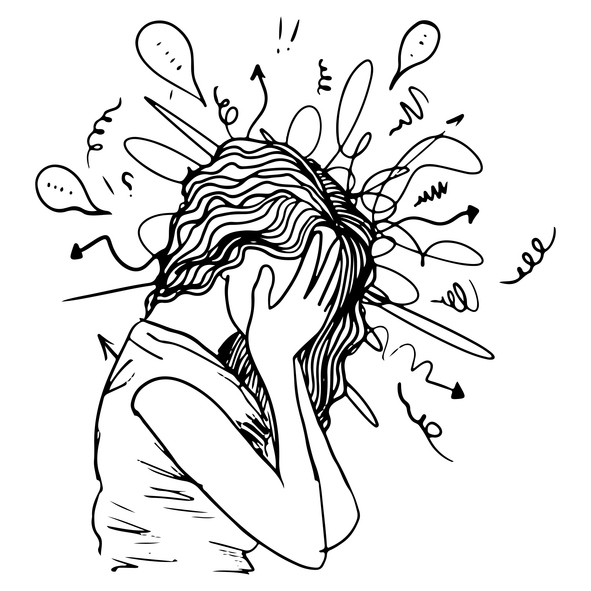I am not an expert in what I write about, but I read a lot and they are always topics that are of interest to me either professionally or personally. To coincide with the Konnexus Health in Data Podcast series I have been looking at some key aspects of the topic of health in more general terms – not from the perspective of data, but a closer look at ourselves in respect to our general wellbeing and how this affects our health. While this is not directly related to recruitment – let’s face it, the better we feel about ourselves and the healthier we feel – the more we will enjoy our work, hit our goals and work better with our colleagues. I have chosen to write about a few topics, mainly as they have been focal points for my own life – but they all intertwine – Sleep, Anxiety, and Mindfulness.
Anxiety
An article I considered not writing, as it is a topic that requires a lot of consideration and covers many aspects. I have posted a number of articles about anxiety, but I have never really looked at it in depth. In reality, for the first time in my life, anxiety has been present. Unlike other feelings I have felt over the years that come with running a business, or feeling stressed about my role as a mum, the feeling of anxiety was so much different.
It started one night recently when I woke up and literally thought I was having a heart attack. The heavy weight that I felt on my chest was so extreme and foreign to me, that I felt this sudden fear. Over the coming days and weeks, I woke up with the same feeling, and even at times just watching TV my whole body would just start hurting. Finally, I was driving home from work one day and I was so overwhelmed that I sat in my car for nearly 2 hours and couldn’t get out (embarrassing to admit) and it wasn’t until I called my sister that I had the courage to get out of the car.
What was going on! Why was this having such a physical impact on me! Why was I scared? I had to understand what was going on and work out way to manage it… so I started to investigate.
So, what is anxiety?
The American Psychological Association (apa.org) describes anxiety as an emotion that can be explained through feelings of tension, worried thoughts and physical changes to the body – such as increased blood pressure and can be described as having intrusive thoughts or concerns. It is not the same as fear, but they can often be interchangeable (as my example would indicate). The Australian Psychological Society (psychology.org.au)describes anxiety as natural and usually short term that is a reaction to a stressful situation, feelings of worry, nervousness or apprehension. However, anxious thoughts or feelings can be more severe with quite strong physical reactions which can interrupt daily life.
When you start to research Anxiety, you soon realise that is comes in different shapes and forms, some which can be quite severe. Healthline (healthline.com) outlines several anxiety disorders which include generalized anxiety disorder (GAD), obsessive-compulsive disorder (OCD), panic disorder, post-traumatic stress disorder (PTSD), social anxiety disorder, phobias, separation anxiety disorder and agoraphobi.
How is it triggered?
To me understanding why I was feeling anxious and why I was feeling so overwhelmed and particularly the physical impact it was having on me, was important. For those who suffer anxiety it seems that it can be triggered by many events or feelings including excessive fear and worrying about an array of things – in turn this can bring on restlessness, agitation, panic, irritability, irrational fear of danger, racing thoughts, shortness of breath or rapid breathing, sleep issues, headache, and stomachache, pounding heart, insomnia, trembling and muscle tension. All experiences that can be short-lived but if not dealt with can have lasting effects.
So how can we manage our anxiety?
Again, I am no expert – in fact a complete novice when it comes to the topic. How one manages anxiety will inevitably come down to us as individuals and the severity of what it is doing to us. Beyond Blue (www.beyondblue.org.au) highlights that mild anxiety can be managed through life style changes, such as physical activity, whereas severe anxiety is potentially treated by Cognitive Behaviour Therapy (CBT) which is a psychological treatment that recognises the way we think and act. Betterhealth.vic.gov.au outlines several ways that we can manage anxiety, including mindfulness, relaxation techniques, building up our self-esteem, breathing, support groups, counselling, diet, and exercise.
For me personally it was about understanding what I was experiencing and to look at ways to manage it that were best for me. I discovered that managing my own anxiety was very much to do with other approaches that have come up a lot in my life, particularly sleep and mindfulness. I worked really hard to put both my mind and body in a state that it no longer felt anxious or hopeless, and it was the below methods that I have found most useful: –
- Sleep – and really focusing on getting enough sleep and using methods such as mindfulness to get myself into better sleeping patterns
- Basically, taking one day at a time. Focusing on the achievement of little goals each day, and ensuring that I was acknowledging these small achievements (‘Hi-Five Tracee’).
- Identifying triggers, which were for me suddenly thinking the worst, and reverting my thoughts to those of a more positive nature (this actually really works)
- Using mindfulness techniques, not just for sleeping, but for times during the day when I started to feel a little overwhelmed
Anxiety is like anything we experience in our lives; it can sneak up on us when we least expect it. For me being able to tackle things straight on, and just focus on dealing with them, is how I have always worked through things – I do not dwell. I understand that is it not always this easy, and I do realise that many people need to get help from others (be it friends, family, work colleagues or professionals) and that is great. For me it is important to acknowledge and deal with things, as they won’t just ‘go away’. I still have a long way to go, but I am getting there.
Tracee Rowe
Konnexus






